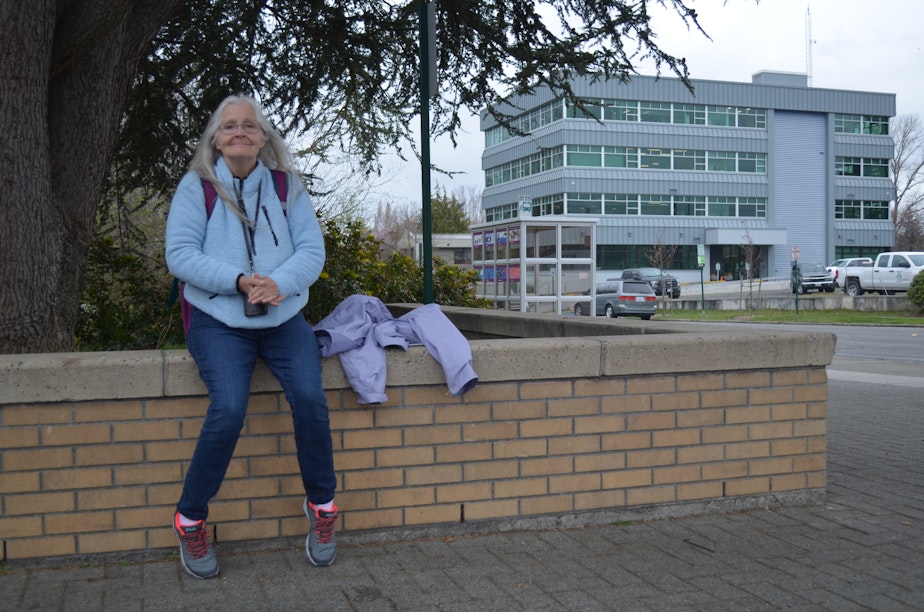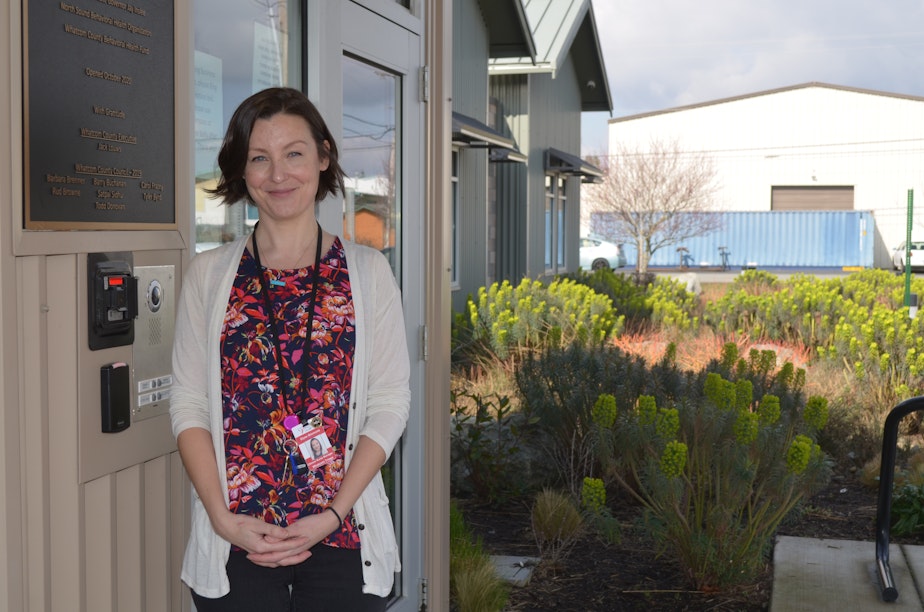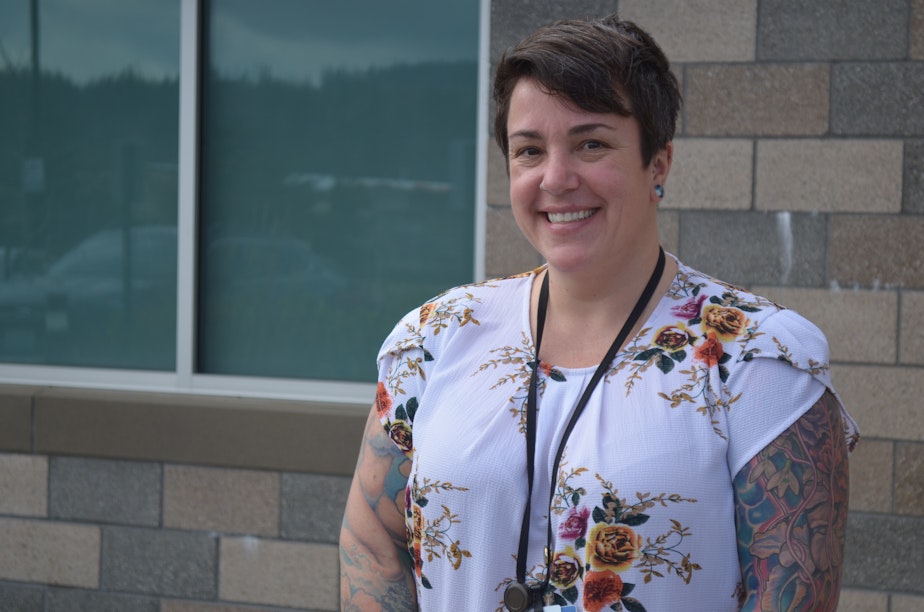King County has no walk-in mental health crisis centers. This levy aims to change that

Kristen Badin is a crisis counselor for Sound in King County: Her job is to answer the phone when people need urgent mental health care. She said, sometimes, she’ll get 15 to 20 calls in a single night from people all over the county. And often, she said, there’s nowhere for those people to go for help.
“Folks call about suicidality,” Badin said. “We have relatives calling out of concern for their family members who might be acting erratically. Sometimes it’s folks that are really struggling with auditory hallucinations or other elements of psychoses.”
For those who qualify for hospitalization, those beds are often full, and people end up waiting in the ER for days or trying to make a safety plan at home. Other times, Badin said, the crisis isn’t severe enough to qualify for a hospital bed.
In those cases, Badin said, “What we’re telling [people] is, ‘You need to get worse; you need to escalate to where you might be a danger to others or to where you’re a danger to yourself.’”
For those who need a lower level of care than a hospital but whose needs can’t be met by outpatient clinicians, the best solution is usually community-based residential treatment — but the average wait for one of those beds in King County is currently 44 days.
Sponsored
Now, ballots are in the mail for a county levy that aims to change these circumstances by funding five behavioral health crisis centers, including one for children. The levy would cost the owner of a median-priced, $700,000 home about $120 per year.
“The best thing about these crisis centers is not just that they open a third door,” Badin said. “It’s that they open that door before things have gotten to a really acute spot.”
King County currently has no walk-in behavioral health crisis centers — but Whatcom County does have one, with 16 beds. It’s owned by the county and operated by Compass Health.

One person who benefited from her time there is Leslie Harvey. Harvey said she’s been severely depressed since she was a teenager, and she’s suffered from abuse and has post-traumatic stress disorder. She’s been hospitalized many times after suicide attempts.
Sponsored
The last time, in 2017, she took a bunch of pills before getting on a bus and blacking out.
“It was so bad, they emptied my stomach and everything, but I was in a coma for five to six hours from what I took,” Harvey said.
After that last hospital stay, she was thinking of suicide again and called her clinician, who recommended that she check herself into Compass Health’s crisis center. She did, and was there for four nights.
“They would take me for walks,” Harvey said. “And when the weather permitted, we’d go outside and walk — even like three miles. I find it mentally healthy to get out and see things.”
Harvey lives with her son, who also has mental health struggles and is on disability. She said she doesn’t have many friends and is pretty isolated.
Sponsored
At the crisis center, she found herself connecting with people and talking about her past trauma and the sources of her depression more than she ever had.
“There are so many people there and it’s open… You know that you're not the only person with these problems,” Harvey said. “In the hospital, you're kind of isolated.”
Harvey’s been back to the crisis center four more times. If that option hadn’t existed, she said, “I would probably not be here. I would have probably killed myself, or attempted to.”

“If we didn’t have this, people would end up in the hospital emergency room, in jail, or on the street, or dead,” said Amy Pereira, the director of crisis response and stabilization at the Compass Health crisis center in Whatcom. “Without facilities, without crisis teams, without mental health services — yeah, the outcomes are grim.”
Sponsored
When people are in crisis, they can call, and Compass Health will send a team to get them. Or folks can get dropped off by a friend, or an ambulance. Outpatient providers can refer a patient to the center, or sometimes, paramedics or police bring someone who needs help, but not to go to jail or the emergency room. Other times, people get discharged from jail or a hospital to the crisis center, which is a lower level of care than the hospital.
Unlike the hospital, everyone at the crisis center is there voluntarily, Pereira said, “so they have to buy into the program and want to be here.”
The center serves a lot of young people — people in their 20s or early 30s — and some of retirement age.
“20s is a prime time for people to have challenges where they need extra support,” Pereira said. “White males at retirement are actually the ones that will die by suicide at a higher rate than anyone else. And so we do see that demographic coming in.”
Elyse Simmons is the clinical nurse manager at the Compass Health crisis center.
Sponsored
“This is our North Hall that leads to an outdoor fenced space for the clients,” Simmons said. “And we have a covered gazebo as well for in the Pacific Northwest when it decides to rain. We’ll just stay a little bit further back here because we have a client who’s having a rough time outside.”
Clients each have their own small room, with a bed nailed to the ground. Bathrooms are shared.
Several times a day, clients are invited to participate in small groups, where they learn things like breathing exercises, or how to make and stick to a schedule.
“The clients can leave here with more tools in their toolbox for their mental health to utilize on the outside,” Simmons said.
When they’re not doing group activities, clients can hang out in the common room. On a recent Tuesday, one person was watching television, and another was working on a puzzle. There were snacks, like bananas and satsumas. And there’s a quiet room with books.
Simmons said they also have social activities: paper airplane competitions, or bowling with extremely soft balls.
“They can have some fun, work on their social interactions with other clients in the unit,” Simmons said. “They really create like their own little society, and they lean on each other and really support one another through their time of need.”
Staff also help clients adjust their medications; about half leave with changed prescriptions.
No one sees a bill from the crisis center: Private insurance pays, or the state picks up the bill.
The average stay is 4.5 days. People are discharged to their homes, or sometimes staff works with them to find transitional housing. They make sure they have a follow-up appointment scheduled with an outpatient provider before they leave.
What isn’t controversial is that crisis centers are needed. What is often controversial is where they’ll be located. King County officials haven’t specified where the five centers paid for by the levy would be, except to say they’d be spread across the county.
The Compass Health crisis center is in an industrial area on the outskirts of Bellingham, next-door to a jail diversion center.
Harvey was considering going back there for a sixth stay just last month. It’s only 10 minutes from her home.




